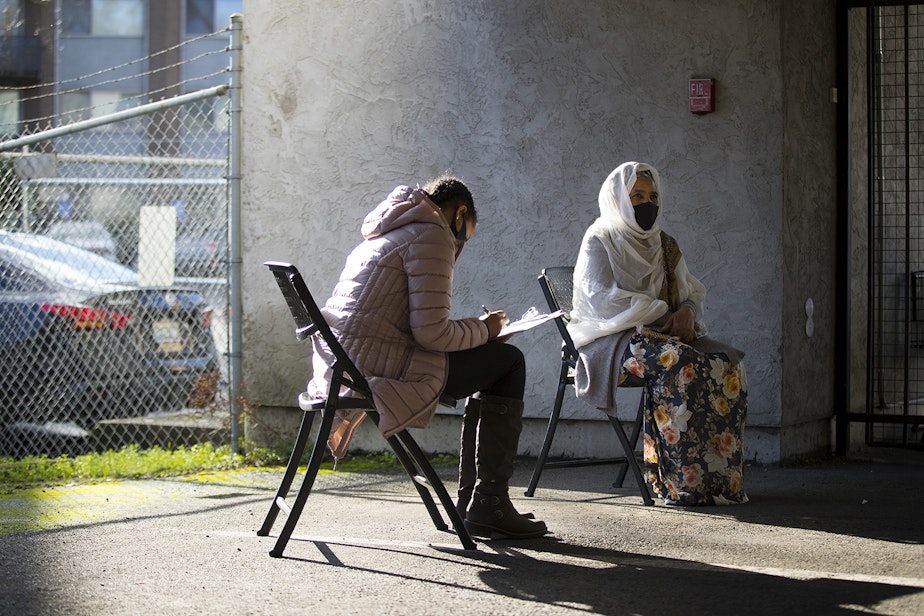Why Washington state's Phase Finder is not achieving vaccine equity

When it comes to Covid-19 vaccines in Washington state, top health officials like to talk about how they’re making the rollout equitable.
They say they’re prioritizing communities of color most impacted by the pandemic. But data the state department of health released last week shows big disparities in vaccinations, with many communities of color getting vaccinated at disproportionately low rates.
Some people may be familiar with just how hard it is to get a vaccination – the frustrating searches through online booking systems or phone calls.
It’s not just that some people have more barriers accessing vaccines than others; it’s that the state created a primary tool to route people to vaccines knowing it wouldn’t work for many communities.
Phase Finder is the online system where you answer questions to see if you’re eligible for a vaccine. And then you print out your eligibility or make a screenshot, and then take that information to vaccine providers.
This is an online system and it was launched almost a month ago — on January 18 — in only English and Spanish. Those are big problems.
Michael Byun heads the non-profit group, Asian Counseling and Referral Service, which is getting a lot of requests for help.
Sponsored
“Especially in our communities of immigrants and refugees, we have a large percentage of our community members who are limited in terms of technology understanding and also in terms of English proficiency," he says. "So that creates additional barriers and requires additional resources to access the information and set up the appointments as necessary.”
Meaning his staff are spending a lot of time without extra funding to help people navigate the state’s system.
Even if you know Spanish, for example, and have a phone, the web app could still be really confusing.
Like, what if you don’t know what a screenshot is?
Angie Hinojos heads the Centro Cultural Mexicano. She says that a group of young men the community recently banded together to help.
Sponsored
“They were all laid off of their restaurant job, they all had Covid-19. And so they were all sequestered, they all share an apartment, they were sequestered in that apartment. They needed help with getting food resources, because they couldn't leave. They're being extremely responsible. OK, but here are the six young men, they have no internet, no computer, one phone amongst the six of them. So how are they going to go to Phase Finder and figure out how to get a vaccine? They're not.”
Hinojos mentioned these young men, but remember older adults make up the latest group to be eligible for the vaccine – and older adults may have additional challenges with technology.
Michelle Roberts is in charge of vaccine planning and rollout at the state Department of Health.
“Our intent from the beginning was never a one stop shot shop for all," Roberts says. "That is the primary place, but we always knew it was not going to meet every community’s need.”
Roberts says the department’s strategy going forward includes making vaccines available in as many different places as possible – from pharmacies, to mass vaccination sites to community health centers.
Sponsored
Paj Nandi is the department's director of equity.
“I think we can still we need to do a better job in terms of accessibility, because we know and we are hearing from across the state, that language and other access barriers continue to be a challenge," Nandi says. "And that's why a lot of our resources right now are being directed and in those efforts.”
Nandi mentioned the department has an eight-point plan around vaccine equity. It includes things like translating materials into dozens of languages and having lots of conversations with different community members. That plan, somewhat ironically, is available online – and only in English.
Now, there’s still a very limited supply of the vaccines. In the meantime, community groups are stepping into the gaps.
Minh-Đức Nguyen heads the organization Helping Link in Little Saigon, which runs classes in English, citizenship and using the iPad. Since December, she’s been leading something of an informal vaccination information service in Vietnamese.
Sponsored
“The majority of my time I’m spending to help people about vaccine," she said. "You get phone call and people need an answer, and you don’t want to, at least I don’t want to give them the run around."
And some groups are setting up one-day vaccination events for their community members.
In one case, the director of the Somali Health Board is a pharmacist and co-owns a pharmacy, so they jumped through the hoops and became an official vaccine provider. Recently they vaccinated 100 people at an apartment building in South Seattle.
“I’m so happy. I’m so excited," Gebbeh Freeman said.
And Ali Haji said he's “happy, happy to forget this killer disease.”
Sponsored
They heard about this vaccination clinic because they got a note on their door, or through word of mouth.
They said they're not great at the internet, meaning the pop-up provided what was likely their only chance to get vaccinated.





